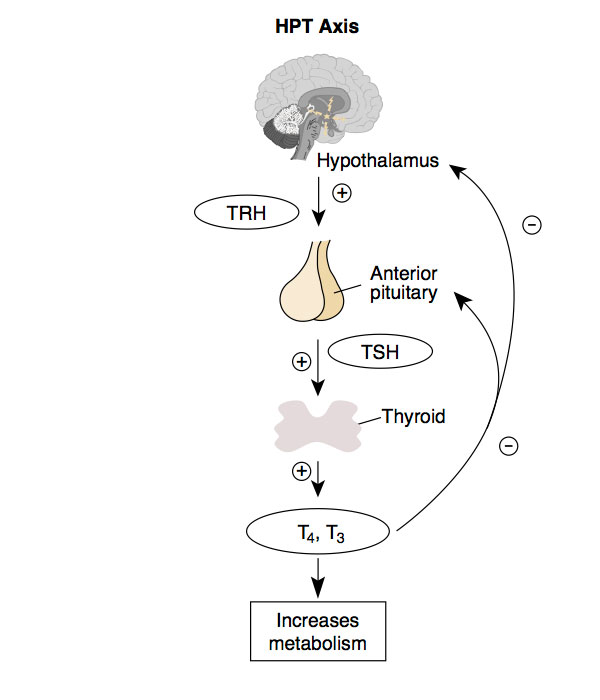5 Essential Thyroid Tests Not To Miss
May 10, 2021
Do you know your Thyroid Levels? Understanding how well your Thyroid is doing is very important. Here are essential tests you can have done to know.
These are all too common scenarios:
1) You have symptoms of high or low thyroid function, and the doctor runs "a thyroid panel." which only includes 1-2 thyroid tests.
2) You get a "comprehensive/Premium/Deluxe/top of the range health screen with all kinds of scanning, cancer markers, the whole menu of marketable but useless tests... including a thyroid "all clear" and again, those numbers only give you 1-2 thyroid tests. A false sense of security if you ask me.
That's simply not enough for a proper look into the thyroid!
To understand thyroid testing, let's recap how the thyroid works.
There are 4 key steps in the hypothalamic–pituitary–thyroid (HPT) axis.

- The Hypothalamus produces thyrotropin-releasing hormone (TRH) which stimulates the Pituitary gland.
- The Pituitary gland then produces thyroid-stimulating hormone (TSH) which stimulates the Thyroid glands.
- The Thyroid glands produces thyroid hormones – Thyroxin (T4) and Triiodothyronine (T3).
- T4 is converted to active, usable T3 when it reaches the cells and tissues in the body.
There is also a lovely feedback mechanism at play, as there are in many of our bodily processes:
- If there is too little T4 in the body, the Pituitary gland will produce more TSH to tell the thyroid glands to produce more thyroid hormones.
- Conversely, when the thyroid hormones in the blood stream are high, it will automatically cause the Pituitary gland to reduce TSH production to help taper down thyroid activity.
Here are the KEY thyroid tests I recommend:
1) Thyroid Stimulating Hormones (TSH)
A high TSH indicates that the thyroid is not making enough thyroid hormones (primary hypothyroidism).
A low TSH indicates that either the thyroid is producing too much thyroid hormones (Hyperthyroidism) or that there is a suppression of the thyroid Axis at the level of the brain.
Standard labs have a wide reference range, which leads to many patients being told that their thyroids are normal, when in fact, they have a thyroid condition brewing.
Optimal TSH range is between 1-2 μIU/mL.
2) Free T4 and Free T3
Free T4 and T3 refers to the hormones that are unbound to specific transport proteins and are able to be used by the body tissues. When checked together with TSH, they give an accurate measure of how the thyroid gland is functioning.
An elevated TSH and low FT4 points towards primary hypothyroidism due to disease in the thyroid gland.
A low TSH and low FT4 indicates hypothyroidism due to a problem involving the pituitary gland in the brain.
A low TSH with an elevated FT4 is found in individuals who have hyperthyroidism.
Testing both free T4 and T3 also reveals T4/T3 ratios and allows us to ascertain if T4 to T3 conversion is happening properly.
3) Thyroid Antibodies
Over 90% of hypothyroidism is caused by autoimmunity.
Not doing these tests for a patient is basically letting a disease develop before you bother treating it. A legacy of the pharmaceutical driven approach. "If there's no drug to treat it, why will I bother diagnosing it early?". This is poor attention on preventative and personalized care.
The two main Thyroid antibody tests I like to know are:
- Thyroglobulin antibodies (Tg)
- Thyroid peroxidase antibodies (TPO)
The presence of any of these two antibodies signal a risk that the body will develop either Hashimoto's or Grave's disease.
BONUS Tip: There are two key nutrients also worth testing for...
1) Iron Panel – Ferritin, TIBC, Iron saturation
Iron deficiency is the most common deficiency among thyroid patients as a result of malabsorption. Hence checking iron status is highly recommended. Here are what you should test for:
Ferritin
Ferritin is a blood cell protein that contains iron. A ferritin test determines how much iron your body is storing. Knowing the level of ferritin in the blood gives an indication of the overall iron level. The higher the ferritin, the more stored iron the body has. Optimal level should be >100ng/ml. A level less than 30ng/ml indicates iron deficiency.
Total Iron Binding Capacity (TIBC)
A total iron binding capacity (TIBC) test measures the level of iron in your bloodstream. It measures how hungry the body is for iron. The higher the level, the hungrier the body is for iron which means there is a low level of iron in your blood stream. A lower level of TIBC means the opposite.
Iron saturations
The iron saturation blood test provides an estimate of the amount of iron storage that is occurring within the body. This result is evaluated against with the above-mentioned test result. Low iron saturation rate (<20%), with high TIBC and low Ferritin point towards iron deficiencies. A condition that is often seen in Hypothyroid patients.
2) Zinc
There are studies that shows that zinc deficiency can cause hypothyroidism. The importance of zinc for thyroid function is also well documented. As zinc deficiency is very common in thyroid patients, testing for the body’s zinc level is recommended. Correcting zinc deficiency can also lead to a better outcome in reversing hypothyroid condition that is caused by autoimmune disease like Hashimoto’s.
There are other thyroid-specific nutrients that I love, but don't test for. WHY?
This is because current tests do NOT reflect true nutrient status, and/or are costly to obtain. My approach would be to simply supplement within safe limits.
Read about the top 5 thyroid nutrients here.
Co-written by Yen Lim Piper and Dr Cheryl Kam
References:
https://thyroidpharmacist.com/articles/top-10-thyroid-tests/
https://www.thyroid.org/thyroid-function-tests/
Thyroid Tests | NIDDK (nih.gov)
https://www.healthyandnaturalworld.com/t3-t4-thyroid-hormones/
Thyroid Antibodies: MedlinePlus Medical Test
https://www.healthline.com/health/ferritin#side-effects
https://healthresearchfunding.org/iron-saturation-blood-test-results-explained/


